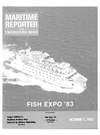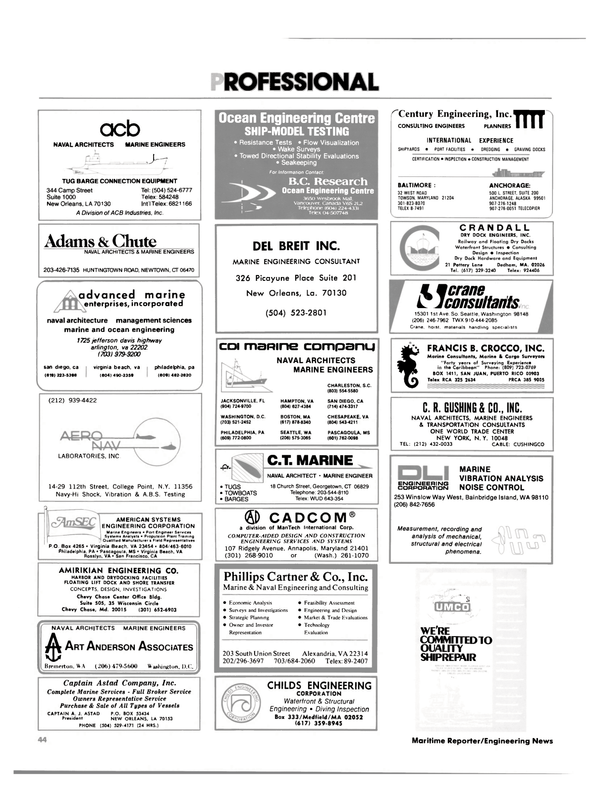
Change In Personnel Licensing Regulations For Commercial Ships Sought By U.S. Coast Guard
The Coast Guard is attempting to simplify and improve the licensing regulations for all commercial vessel personnel. The proposed amendments in CGD81-059 offer a license structure with career patterns for persons serving on all waters and on all kinds of vessels, from small passenger vessels to large oceangoing vessels. The proposed regulations also incorporate the requirements of the International Convention on Standards of Training, Certification and Watchkeeping for Seafarers, 1978 (STCW).
Major changes/key points: The notice proposes a simplified two license structure (Master/ Mate and Chief Engineer/Assistant Engineer) on inland waters for service on any tonnage vessel and also for service on vessels up to 1,600 gross tons on near coastal waters (up to 200 miles offshore).
Trade restricted licenses would be eliminated— except for the restricted licenses established in law: uninspected towing and fishing vessels, pilot, motorboat operator, and non-navigating river mate.
Ocean operator and operator licenses will become masters and mates with route and tonnage limitations extended to 200 gross tons and near coastal waters.
License operators of uninspected towing vessels will be able to credit service toward obtaining master or mate licenses.
Special "industrial" licenses are established for officers who work on mobile offshore units.
Changes to requirements for a motorboat operator license will make it easier to obtain initially (on inland waters) and easier to use as a stepping stone to more advanced licenses.
The written exam subjects for the licenses have been standardized and would be listed in the new regulations. Consideration is being given to removing or limiting exam items on celestial navigation. Comments are specifically invited on this topic.
Exams for licenses would be required only at entry and command level.
When any license is renewed, the license holder would be required to complete an open book exercise (all of which could be done through the mail).
For persons who may have difficulty with written exams, the new rules would provide for oral exams administered under special circumstances.
Present license holders will be able to take advantage of the new structure when they renew their license or if they present information to the Coast Guard that justifies obtaining the new license earlier. (Note: If an officer is otherwise qualified to upgrade his license to a command level, he will have to take a partial exam on "command" topics).
The proposed regulations would allow substitution of simulator time or special training for underway service.
The proposed regulations would eliminate the special consideration given to former members of the armed forces regarding recency of experience.
The Coast Guard Regional Exam Centers will have more latitude in evaluating certain licensing matters.
Flow charts have been added to the regulations to illustrate the pattern of career advancement possible under the proposed rules.
Public comment period closes on December 6, 1983.
The complete proposed rule making appears in the Federal Register/Vol. 48, No. 153/Monday August 8, 1983.
If you have questions concerning the proposed regulations, contact LCDR George Naccara (202) 426-2240.
Read Change In Personnel Licensing Regulations For Commercial Ships Sought By U.S. Coast Guard in Pdf, Flash or Html5 edition of October 1983 Maritime Reporter
Other stories from October 1983 issue
Content
- Jeffboat Building Three Title XI Approved Cruise Vessels Worth $28-Million page: 4
- Tacoma Boat Completes $143-Million Financing To Build Two Thai Corvettes page: 5
- Blue Star Line To Add Four New Reefer Ships page: 5
- Centrico Forms New Mineral Oil Group Headed By Lohmeyer page: 5
- Joint Venture Receives Title XI For $109-Million Chemical Carrier page: 6
- COMSAT World Systems Division Announces Three Vice Presidential Changes page: 7
- National Steel Receives $13-Million Order To Overhaul The U.S.S. Cayuga page: 7
- Title XI Approved On $24-Million Package For Puget Sound Tug & Barge page: 8
- Lamberts Point Barge Title XI Approved For $20-Million Coal Barge page: 8
- E U R O P O R T ' 83 page: 8
- MARCO Pacific Shipbuilding Formed In Taiwan page: 9
- St. Louis Ship Delivers 6,000-HP Towing/Supply Boat To Gulf Fleet Marine page: 10
- Construction Of Two RAN Minehunters Progressing At Carrington Slipways page: 12
- FISH EXPO '33 page: 14
- Marine Coating Directory Is Offered By Farboil page: 19
- Radm. Meyer Receives New Assignment page: 20
- B&W Diesel Acquired By American M.A.N. page: 21
- Emergency Medical Course Offered By Marine Safety page: 21
- National Marine Opens New Facility In Norfolk page: 22
- $19.9-Million Contract Awarded Tracor By Navy page: 22
- Icebreaking Supply Vessel M/V Miscaroo Delivered By Vancouver Shipyards page: 22
- Apelco Relocates To Tampa, Names Vourloumis New Marketing Manager page: 23
- Hydranautics Shiplift Commissioned At Hyundai page: 23
- Terry To Manufacture And Sell AEG-Kanis Steam Turbines In North America —Literature Available page: 24
- High-Speed Supermaran Ferry Marine Hawk Enters Service page: 24
- M/V GRAND REPUBLIC page: 26
- NATO FRIGATES Current Situation And Future Design Trends page: 26
- Harris Awarded $12-Million WATERCOM Telephone Contract page: 32
- Environmental Systems Changes Name To Electrolux Envirovac page: 32
- Soviet Merchant Fleet Now 'Blankets The Globe' page: 33
- Drilling Rig Dry Transport Cuts 11,000-Mile Sailing Time In Half page: 34
- Notional Supply Advances Ayers To Product Manager page: 34
- Wijsmuller's First 'Mighty Servant' Heavy-Lift Carrier Is Commissioned page: 36
- Nichols Brothers Launches M/V Tiny page: 36
- CDI Marine Announces Management Reorganization page: 38
- Daewoo Delivers $74-Million Offshore Rig page: 39
- Change In Personnel Licensing Regulations For Commercial Ships Sought By U.S. Coast Guard page: 40
- Moss Point Marine Delivers 'Nicor Power' To Nicor Marine page: 40
- Marathon Oilfield Service Offers Color Brochure On Rigs And Resources page: 41
- Bath Iron Appoints Four New Directors page: 41
- Hitachi Announces Top Management Appointments page: 42
- Burrard Yarrows Delivers Icebreaker/Utility Vessels To Gulf Canada Resources page: 42
- NKK To Build Mobile Drilling Island For Beaufort Sea Project page: 42
- Peterson Builders Offers 56-page Review Of 50 Years Of Boatbuilding History page: 43
- Tenneco In Joint Venture To Operate Its Own Service Boats In Gulf page: 43
- McDermott Derrick Barge 27 Upgraded to 2,400-Ton Lift page: 47
- USCG Gentian Recommissioned After $8.3-Million Renovation page: 47
- Navidyne And Medical Advisory Systems Provide Free Introductory Medical Service page: 47
- Twin City Shipyard Delivers Split Hull Barges To Panama page: 49
- Wartsila AB Delivers LPG/Ammonia Tanker To Maraven In Venezuela page: 49
- Daewoo Employs Unique Floating Drydock And Ship Transfer System page: 49
- Blount Marine Delivers Star of Chicago To Star Line Corporation page: 53
- 380-Foot Drillship To Be Auctioned In Singapore page: 54
- General Dynamics Building Cargo Transfer Platform Barge With National Jacking System page: 54
- Nashville Bridge Delivers Pair of Utility Barges To Piling-Structures Inc. page: 58


